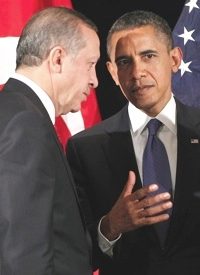
Meeting on the sidelines of the second Nuclear Security Summit in Seoul, South Korea, on March 25, President Obama met with Turkish Prime Minister Recep Tayyip Erdogan to discuss sending supplies to the Muslim Brotherhood in Syria that is opposing the Assad regime.
According to a U.S. government spokesman, Obama and Erdogan considered channeling medical and communications equipment to the opposition forces. These supplies would be non-lethal, according to reports of the meeting. What sort of “non-lethal” supplies would be given in the civil war, however, are not clear. Body armor, communications equipment, shelters and clothing, food, potable water and fuel all would seem to be “non-lethal,” but as any general in war knows, such supplies are emphatically part of waging war and denying enemies those supplies is often the way wars are won.
The Syrian Muslim Brotherhood at the Turkish capital has solemnly promised that its goal was to create a democratic Syria with equality for all religious groups and suppression of terrorism. Syria is a cauldron of groups that do not like each other at all. There is an ancient Christian community that is wary of any sudden changes in government. The Assad family itself are Alawite Muslims, a splinter group considered heretics by most Muslims. Kurds, non-Arabic peoples who have been resisting assimilation by neighbors for at least 2,500 years, hold a segment of Syria. Druze Moslems inhabit some valleys of the nation. In view of its widely dissimilar, often-at-odds population, It seems to be an unrealistic stretch of optimism for any serious observer of the Syrian crisis to expect that a group like the Muslim Brotherhood, which is formally committed to jihad, will make Syria better.
The experience of the Egyptian Muslim Brotherhood, however, suggests that promises of a tolerant society may turn out to be rhetoric intended to please the Western democracies. It also made promises of tolerance once the Mubarak regime was ousted, but the pressure on religious minorities, especially the large Coptic Christian Church in Egypt, has been overtly threatening to the Christians of Egypt. (See: "Anti-Christian Violence Continues in Egypt.")
The Muslim Brotherhood in Tunisia has also taken a sharply Islamist turn seen gaining power in elections in that nation. The rise of radical Islam in the wake of dying secular regimes such as the Baathist Party governments of Iraq (and soon, probably, Syria) ought to be an object lesson in the futility of trying to bring "democracy" to societies that are grounding in utterly different values. Even in the United States, "democracy" — majority rule — would be destructive of liberty, since it inevitably results in the majority — or the government acting in the name of the majority — violating basic rights. It is for this reason that America’s Founding Fathers created a Republic, not a Democracy, a government of law under which rights are protected. But in a country that does not have a long tradition of freedom, and that has a sizeable population that wants to impose Sharia (Islamic) law on others, democracy could well become a means for the establishment of a radical Islamist regime.
No American need defend the regimes of dictators such as Hussein, Mubarak, Khadifi or Assad. Each has imprisoned and tortured political opponents, censored opposition voices, and employed brutality to rule the nation. (in the case of Assad, the regime is a dynasty, as would doubtless have been true of Khadifi, Hussein or Sadat.) These sorts of governments are as old as the Bible and as brutal as Assurbanipal or Nebuchadnezzar.
The news reports that the Assad regime has killed tens of thousands of Syrians is not “news,” although it is presented in news reports as startling discoveries these days. All these strong men have been slaughtering their own people for decades while the media largely ignored these moral offenses. Inevitably when one strongman or group is overthrown, another just as bad replaces it.
When the Shah lost power in Iran three decades ago, the Shiite extremists who took power entered into a decade-long and bloody war with Iraq. The mullahs sent young Iranian men to “sweep” Iraqi minefields by marching through them. Hussein used rockets and poison gas against the Iranians. What, in the world, could our nation do in that situation, which resembled the Russian Front in the Second World War? In a foreign policy that is as incongruous as it is without constitutional foundation, our government tilted U.S. policy toward Saddam Hussein’s Iraq. Later of course, our ally Saddam became our enemy.
When Sadat was assassinated three decades ago, Mubarak set up his own strongman government, which our government supported until it was overthrown last year. Who ruled before the strongmen? Kings and shahs held power, as in ancient days. The pattern is drearily familiar: in lands long accustomed to resolving political issues through violence and dominated by religious beliefs in which the love of peace is subordinated to the conquest of the infidels for Islam, the changes that will bring peace and happiness do not involve the replacement of one group of thugs with another group of thugs.
Our best service to the simmering cauldron that is much of the world, is to remain a land of freedom, hope and peace — friendly with all who will be our friends and seeking honor in our dealings with everyone.
George Washington admonished Americans in his farewell address in 1796: "Observe good faith and justice towards all nations; cultivate peace and harmony with all."
Photo: President Barack Obama talks with Prime Minister of Turkey Recep Tayyip Erdogan during their bilateral meeting in Seoul, South Korea, March, 25, 2012.: AP Images



